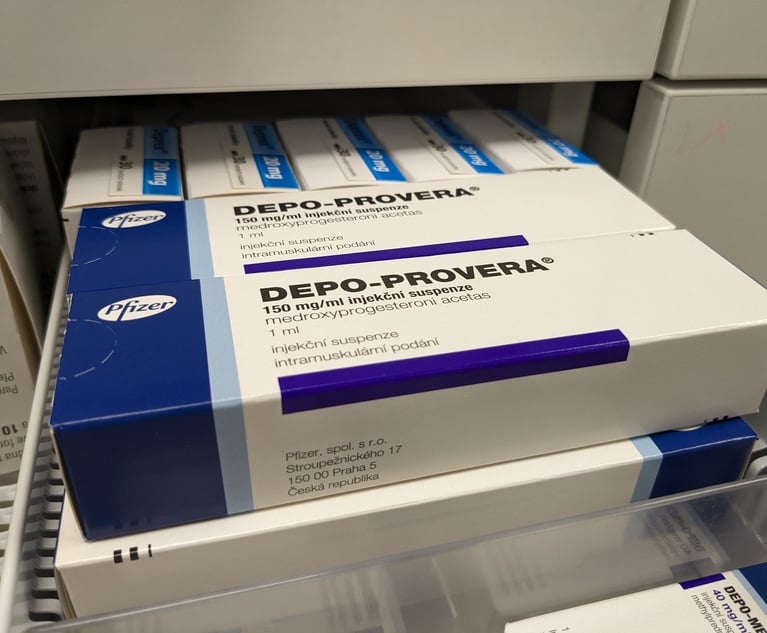Another Law School Drops Suit Against ABA
With Florida Coastal School of Law ending its suit against the ABA, just one of four similar accreditation suits remains pending. Florida Coastal Dean Scott DeVito said a recent visit by ABA factfinders has left the school confident that the accreditation process will go smoothly in the future.
February 27, 2019 at 11:59 AM
5 minute read
 Florida Coastal School of Law. Courtesy photo
Florida Coastal School of Law. Courtesy photo
The flood of accreditation lawsuits filed against the American Bar Association by law schools in 2017 and 2018 has all but evaporated, with just one of the four litigations still pending.
Florida Coastal School of Law and the ABA's legal education arm on Tuesday filed notice in federal court that they are jointly dismissing the suit the Jacksonville school brought last May, which alleged that the ABA's law school accreditation standards are unlawfully vague and applied unevenly across campuses. The ABA had found the school out of compliance with its admissions standards.
The new filing offered no insight into why the parties are dismissing the case, but Florida Coastal Dean Scott DeVito said Wednesday that the school is confident in the ABA's accreditation process moving forward.
“The primary reason we are dropping the suit is that our faith in the process has been restored based on the council's and section's interactions with us on our pending issues the last few months, and after the factfinders came last week,” he said.
Barry Currier, the ABA's managing director of accreditation and legal education, said the suit's dismissal—with prejudice and with each side paying its own costs—is a positive development.
“The ABA and the Council welcome the end of this dispute,” Currier said in a prepared statement. “We look forward to continuing to serve the best interests of law students, the public, and the profession through the ABA law school accreditation process, which has consistently been upheld by courts and has been approved by the U.S. Department of Education.”
DeVito sent an email to Florida Coastal students Tuesday to tell them that ABA factfinders had visited the campus last week, giving the school an opportunity to highlight the recent improvements it has made. That visit instilled confidence that Florida Coastal would soon be found in full compliance with the accreditation standards. The ABA's Council of the Section of Legal Education and Admissions to the Bar is slated to consider Florida Coastal's accreditation status when it meets in May.
“We talked about our entering credentials being on par with or better than 44 other law schools, our Florida first-time bar pass being above 4 out of 5 comparable law schools in Florida and just 5.5 points below first-tier University of Florida in 2018, the strength and skill of our faculty and academic support, our continuing improvements in career placement, and what great students we have,” DeVito wrote to students.
Moreover, DeVito said administrators are hopeful that the ABA will back the school's bid to become a non-profit and possibly merge with an established university. (Florida Coastal is currently a for-profit campus owned by InfiLaw Inc. It aims to spin-off from InfiLaw and be governed by its own board, but that change requires the approval of the ABA and other higher education authorities.)
With the dismissal of the Florida Coastal case, only the defunct Charlotte School of Law's suit remains pending against the ABA. That docket in that case has been quiet since October.
The ABA first became a target for litigation in November 2017, when Western Michigan University Cooley Law School sued after it was found out of compliance with the accreditation standards. The school dropped that suit a year later, after the legal education council determined that it was back in full compliance.
All three of InfiLaw's schools—Charlotte, Florida Coastal and Arizona Summit Law School—sued the ABA in May of 2018. The circumstances vary slightly in each case, but the schools each argued that they had been wrongfully found out of compliance with the ABA's accreditation standards. In the case of Charlotte, the plaintiffs claim the ABA's accreditation actions led the school's closure in 2017. Arizona Summit dropped its case against the ABA in January, after determining that it will close. (The Phoenix school stopped holding classes last fall, but it will officially remain a school until its remaining students finish their studies at other law schools. The ABA revoked its accreditation in June.)
Florida Coastal had argued in court papers that the Law School Admission Test scores and undergraduate grades of its new students had improved significantly in recent years, and that its bar pass rates had similarly climbed. It claimed that it had performed better in those areas than some schools that had not been found out of compliance by the ABA.
“Florida Coastal and InfiLaw have decided that our lawsuit against the ABA is no longer necessary to protect the interests of our students, alumni, faculty, and staff, and we are dismissing the lawsuit,” DeVito wrote in his message to students.
This content has been archived. It is available through our partners, LexisNexis® and Bloomberg Law.
To view this content, please continue to their sites.
Not a Lexis Subscriber?
Subscribe Now
Not a Bloomberg Law Subscriber?
Subscribe Now
NOT FOR REPRINT
© 2024 ALM Global, LLC, All Rights Reserved. Request academic re-use from www.copyright.com. All other uses, submit a request to [email protected]. For more information visit Asset & Logo Licensing.
You Might Like
View All

From 'Confusing Labyrinth' to Speeding 'Roller Coaster': Uncertainty Reigns in Title IX as Litigators Await Second Trump Admin
6 minute read
New Class Action Points to Fears Over Privacy, Abortions and Fertility
Trending Stories
- 1Judicial Ethics Opinion 24-68
- 2Friday Newspaper
- 3Judge Denies Sean Combs Third Bail Bid, Citing Community Safety
- 4Republican FTC Commissioner: 'The Time for Rulemaking by the Biden-Harris FTC Is Over'
- 5NY Appellate Panel Cites Student's Disciplinary History While Sending Negligence Claim Against School District to Trial
Who Got The Work
Michael G. Bongiorno, Andrew Scott Dulberg and Elizabeth E. Driscoll from Wilmer Cutler Pickering Hale and Dorr have stepped in to represent Symbotic Inc., an A.I.-enabled technology platform that focuses on increasing supply chain efficiency, and other defendants in a pending shareholder derivative lawsuit. The case, filed Oct. 2 in Massachusetts District Court by the Brown Law Firm on behalf of Stephen Austen, accuses certain officers and directors of misleading investors in regard to Symbotic's potential for margin growth by failing to disclose that the company was not equipped to timely deploy its systems or manage expenses through project delays. The case, assigned to U.S. District Judge Nathaniel M. Gorton, is 1:24-cv-12522, Austen v. Cohen et al.
Who Got The Work
Edmund Polubinski and Marie Killmond of Davis Polk & Wardwell have entered appearances for data platform software development company MongoDB and other defendants in a pending shareholder derivative lawsuit. The action, filed Oct. 7 in New York Southern District Court by the Brown Law Firm, accuses the company's directors and/or officers of falsely expressing confidence in the company’s restructuring of its sales incentive plan and downplaying the severity of decreases in its upfront commitments. The case is 1:24-cv-07594, Roy v. Ittycheria et al.
Who Got The Work
Amy O. Bruchs and Kurt F. Ellison of Michael Best & Friedrich have entered appearances for Epic Systems Corp. in a pending employment discrimination lawsuit. The suit was filed Sept. 7 in Wisconsin Western District Court by Levine Eisberner LLC and Siri & Glimstad on behalf of a project manager who claims that he was wrongfully terminated after applying for a religious exemption to the defendant's COVID-19 vaccine mandate. The case, assigned to U.S. Magistrate Judge Anita Marie Boor, is 3:24-cv-00630, Secker, Nathan v. Epic Systems Corporation.
Who Got The Work
David X. Sullivan, Thomas J. Finn and Gregory A. Hall from McCarter & English have entered appearances for Sunrun Installation Services in a pending civil rights lawsuit. The complaint was filed Sept. 4 in Connecticut District Court by attorney Robert M. Berke on behalf of former employee George Edward Steins, who was arrested and charged with employing an unregistered home improvement salesperson. The complaint alleges that had Sunrun informed the Connecticut Department of Consumer Protection that the plaintiff's employment had ended in 2017 and that he no longer held Sunrun's home improvement contractor license, he would not have been hit with charges, which were dismissed in May 2024. The case, assigned to U.S. District Judge Jeffrey A. Meyer, is 3:24-cv-01423, Steins v. Sunrun, Inc. et al.
Who Got The Work
Greenberg Traurig shareholder Joshua L. Raskin has entered an appearance for boohoo.com UK Ltd. in a pending patent infringement lawsuit. The suit, filed Sept. 3 in Texas Eastern District Court by Rozier Hardt McDonough on behalf of Alto Dynamics, asserts five patents related to an online shopping platform. The case, assigned to U.S. District Judge Rodney Gilstrap, is 2:24-cv-00719, Alto Dynamics, LLC v. boohoo.com UK Limited.
Featured Firms
Law Offices of Gary Martin Hays & Associates, P.C.
(470) 294-1674
Law Offices of Mark E. Salomone
(857) 444-6468
Smith & Hassler
(713) 739-1250









